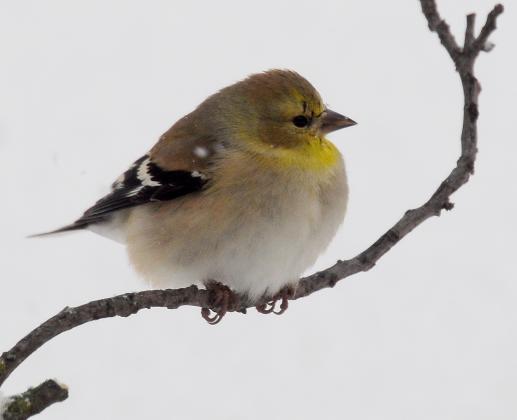A little more than a year ago, I featured the American goldfinch, a common winter visitor to southwest Oklahoma.
This week’s featured creature is its smaller cousin, the lesser goldfinch.
I enjoy watching and photographing lesser goldfinches, which usually requires visiting southern or western Texas.
However, while southwest Oklahoma isn’t included in the lesser goldfinch’s normal range, this bird does occasionally visit here in the winter and during spring migration.
However, as I’ve mentioned in the past, birds don’t always observe normal population ranges and will fly where they want. There have been quite a few sightings of these birds in and around Lawton this season.
This species is sometimes called the black-backed goldfinch or Arkansas goldfinch, which is odd to me, as that state is way out of its normal range. It’s been reported in Arkansas a few times but not enough to warrant that name, in my opinion.
Appearance
At 3.5 to 4.3 inches in length, the lesser goldfinch is smaller than the American goldfinch, which measures 4.3 to 5.1 inches.
It has a blackish conical bill, which is stout but sharply pointed.
Adult males in breeding plumage are glossy black above and bright yellow below, with white patches in the wings (photo).
In winter, the black coloring on males fades quite a bit, but they retain a fair amount of black on the head, often in the form of a black cap.
Females are duller than males (photo) and lack the black cap of males.
Habitat
Generally, semi-open areas of many kinds, including brushy country, open woods, wooded streams and gardens.
Food
Mostly seeds but some insects, especially when breeding. Most seeds consumed are from the sunflower family.
The Cornell Lab of Ornithology reports that, like American goldfinches, lesser goldfinches cling to the seed heads of tall plants, bending the stem down so that it can hang upside down while picking at the seeds.
Lesser goldfinches readily come to feeders. They enjoy many kinds of seeds from the sunflower family, including the thin-hulled seeds of Nyjer (thistle).
They will also eat black oil sunflower seeds, both regular and hulled.
Range
The lesser goldfinch is a bird of the American West, Southwest and Mexico. Its breeding population includes much of the American West and just a small portion of the western Oklahoma Panhandle. Its permanent range includes the southern half of Texas west to California and south through Mexico.
Odds and ends
Two color patterns occur in the United States, and males west of the Rocky Mountains may be either green-backed or black-backed.
On another note, a slaty-backed gull has been visiting Lake Hefner in Oklahoma City for a few days. As of Wednesday, it was still being seen, often in the middle of the lake, or with other groups of gulls on the east side of the lake. I will attempt to visit this week to observe the bird and get some photos. I will keep you advised.
Please don’t forget to check out my Randy’s Natural World YouTube channel, www.youtube.com/user/randyadventure. I’m making new videos as quickly as I can.
Editor’s Note: Randy Mitchell is a freelance writer and photographer. He has been an avid birdwatcher, nature enthusiast and photographer for more than 40 years. Reach him at rnw@usa.com.


